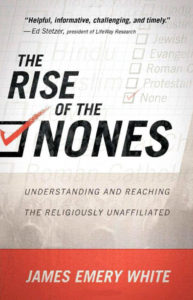Q&A with James Emery White
By Carol Pipes
James Emery White is senior pastor of Mecklenburg Community Church in Charlotte, North Carolina, and adjunct professor of theology and culture at Gordon-Conwell Theological Seminary. His latest book Rise of the Nones: Understanding and Reaching the Religiously Unaffiliated describes the fastest-growing religious group of our time.
Between 1990 and 2008, the number of nones, those who indicate no religious preference, leaped from 8.1 percent to 15 percent. In 2012 that number climbed to nearly 20 percent, representing 1 of every 5 Americans.
His book offers a comprehensive look at the nones and how churches can reach them. We caught up with White to ask him about this growing group.
F&T: What was the motivation behind this book?
White: Without a doubt, the nones constitute the religious story of our day. They are now the second-largest and fastest-growing religion in America. As the pastor of a church committed to reaching out to those far from God, knowing about the nones is paramount.
Yet this is such a new phenomenon, there hasn’t been anything written about it from a Christian perspective explaining this group and suggesting ways to respond. As the subtitle of the book says, it’s about understanding and reaching the nones.
What are some characteristics of a typical none?
We could walk through many basic demographic markings, and I outline those in the book, but the two headlines that should jump out are these: they are not atheists, and they are not seekers.
Both of these findings address the typical caricatures people would understandably have. You would assume someone who says they are nothing would be an atheist, but the vast majority aren’t atheists. They would consider themselves quite spiritual, just not religious.
As for the seeker label, that doesn’t apply. They are not looking for a particular religion, much less a church home. They are quite content where they are.
What are some of their beliefs?
That’s more difficult to pin down, as there is great variety. But you can certainly count on them reflecting the dominant values of the culture. For example, “tolerance,” defined as all things equally true and valid and thus equally affirmed.
The nones would be liberal in orientation on almost every social issue. They would also consider many Christians to be judgmental, intolerant, and unloving. In other words, they don’t think we look much like Jesus.
Dig Deeper |
 |
| Rise of the Nones by James Emery White |
You write that nones are not necessarily leaving the faith or denying the faith, but they don’t want to be labeled Christian. Can you unpack this trend?
It really is about labels, and what comes with labels. To be labeled is to be identified as something, and with that identification comes a set of beliefs, values, or lifestyle norms. They don’t want that.
They don’t really believe in orthodoxy in its historic Christian sense, and labels reflect at least some set of transcendent beliefs.
How should the church adapt its approach to outreach and evangelism?
That’s what the book is about, so let me see if I can offer a simple overarching theme. I would suggest churches move from an Acts 2 model to an Acts 17 model.
By that I mean that in Acts 2, you had Peter addressing the God-fearing Jews of Jerusalem. On a spiritual scale from one to 10, they were probably an eight.
They believed in God, the Old Testament scriptures, heaven and hell, and a promised Messiah. That’s a lot to begin with! And Peter fashioned his approach accordingly.
Fast forward to Paul in Acts 17. On our imaginary scale, they were probably about a two. Paul didn’t approach them as God-fearing Jews, but as the (at best) agnostics that they were. He had to start with creation and work his way forward.
He understood that evangelism, for that group, would involve both process and event. Too many churches are taking an Acts 2 approach in an Acts 17 world.
How do you have a spiritual conversation with someone who doesn’t care about God?
If they have hardened thoughts, it’s less with theology and more with characterization. They often have very negative views of religion, and often, religious people.
But if you can get past that, they are quite willing to hear an explanation of the Christian perspective on any and every issue. Particularly, if you start out with their questions and concerns as a bridge to the Bible.
Your church has been reaching the unaffiliated for 20 years. How are you doing that?
Strategies come and go; they change and evolve. But what hasn’t changed for us is the centrality of the mission, and the culture that has resulted from making that mission central.
I know a lot of churches talk about this, but at Mecklenburg, being turned outward and focusing all of our outreach on those far from God really is our DNA. It’s not just rhetoric, but a deep and pulsating value.
From that, we are able to do whatever it takes, in whatever era of history we find ourselves, to reach those who are not followers of Christ.
Carol Pipes (@CarolPipes) is editor of Facts & Trends.






